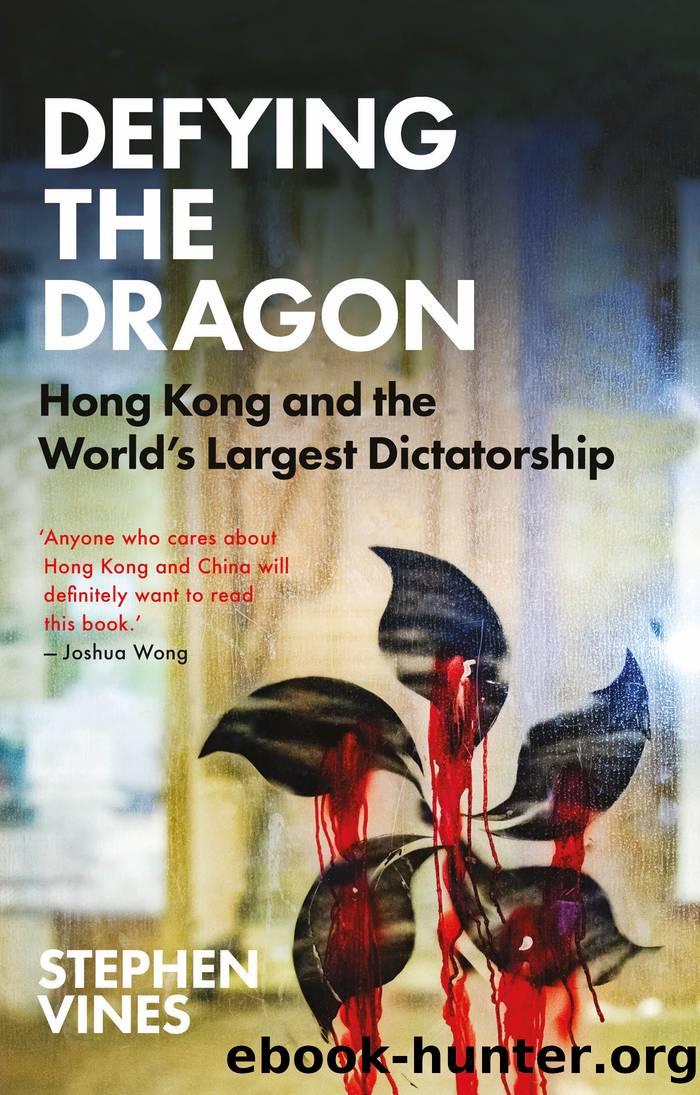Defying the Dragon by Stephen Vines

Author:Stephen Vines
Language: eng
Format: epub
Publisher: Hurst
Published: 2021-03-15T00:00:00+00:00
PART THREE
THE UNEXPECTED AND THE FUTURE
9
VIRUS AND CRISIS
At the beginning of 2020, protests in Hong Kong were ongoing, just with less ferocityâbut they were soon overshadowed by another development which spread rapidly far beyond the SAR: the outbreak of Covid-19 in the central Mainland city of Wuhan. The uprising and the virus were coincidental, but linked by the blow they have delivered to the Chinese regime. Had Beijing âsimplyâ been coping with international fallout from the crackdown in Hong Kong, the diplomatic nightmare on its hands would have been quite serious enough; but the fallout from the pandemic turned the nightmare into a full-scale crisis of credibility. At home, the crisis had the effect of sowing doubt over the invincibility of the regime, as citizens slowly became aware that the pandemic was being covered up, and then started suffering from its dire economic impact.
What the virus exposed, or maybe confirmed, was that China could not be trusted or relied upon when it came to confronting crucial events that brought the interests of the ruling party into conflict with other, public interests. As we saw in Chapter 3, it is precisely this logic that always places Party before profits. And to preserve the interests of the rulers the instinctive response of all authoritarian systems is to cover up bad news, as anything other than good news detracts from their preferred image of success. This is why China lost valuable time curbing the coronavirus and compounded the tardiness of its response by focusing on suppressing news of the outbreak, in preference to getting it under control.
In a series of social media posts, now deleted, Xin Mengâa researcher at Chinaâs National Institute for Viral Disease Control and Preventionâwrote that, when fighting a virus, âPolitics comes first, security the second, science the thirdâ.1 This means that, even when a deadly public health threat emerges and there is a compelling need for those in charge to be notified, the risks of delivering bad news tend to outweigh the benefits of behaving responsibly. The reality of how the system works is known throughout China. Wei Peng, a doctor at a fever clinic in a Wuhan community hospital at the epicentre of the outbreak, explained why, despite knowing about the new virus, he had not dreamt of bringing it to the attention of his superiors: âThere is no gain for you if you report. No one would blame you if you didnât.â On the other hand, the process of reporting things that the authorities do not want to hear only invites âtedious troubleâ.2
When the news eventually got out, however, there was no place to hide. The leadership in Beijing then came up with the proposition that its way of handling the pandemic was infinitely superior to the response of elected governments overseas, because only authoritarian governments have what it takes to deal with emergencies on this scale. In September 2020, President Xi put it this way: âThe major strategic achievement gained from Chinaâs fight against COVID-19 fully
Download
This site does not store any files on its server. We only index and link to content provided by other sites. Please contact the content providers to delete copyright contents if any and email us, we'll remove relevant links or contents immediately.
| Central Asia | Southeast Asia |
| China | Hong Kong |
| India | Japan |
| Korea | Pakistan |
| Philippines | Russia |
The Sympathizer by Viet Thanh Nguyen(4372)
The Rape of Nanking by Iris Chang(4191)
World without end by Ken Follett(3460)
Ants Among Elephants by Sujatha Gidla(3451)
Blood and Sand by Alex Von Tunzelmann(3181)
Japanese Design by Patricia J. Graham(3155)
The Queen of Nothing by Holly Black(2576)
City of Djinns: a year in Delhi by William Dalrymple(2542)
Foreign Devils on the Silk Road: The Search for the Lost Treasures of Central Asia by Peter Hopkirk(2452)
India's Ancient Past by R.S. Sharma(2440)
Inglorious Empire by Shashi Tharoor(2425)
Tokyo by Rob Goss(2421)
In Order to Live: A North Korean Girl's Journey to Freedom by Yeonmi Park(2372)
Tokyo Geek's Guide: Manga, Anime, Gaming, Cosplay, Toys, Idols & More - The Ultimate Guide to Japan's Otaku Culture by Simone Gianni(2354)
India's biggest cover-up by Dhar Anuj(2342)
The Great Game: On Secret Service in High Asia by Peter Hopkirk(2325)
Goodbye Madame Butterfly(2241)
Batik by Rudolf Smend(2169)
Living Silence in Burma by Christina Fink(2055)
